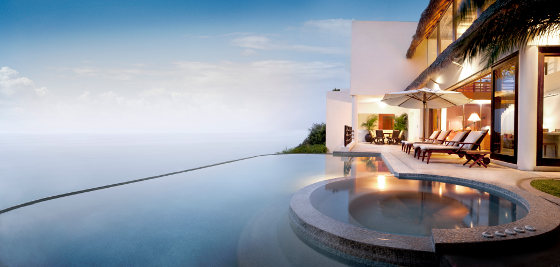When deciding whether or not to join a destination club or residence fund, prospective members often compare investing in a second home, to purchasing a destination club membership. For many years, SherpaReport has been hearing the reasons travelers choose to join these clubs and funds rather than buying a second home. A new study by Exclusive Resorts shows a similar set of results.
According to the study, 81% of high-net-worth (HNW) second and third home owners hate or dislike their vacation home. Their top three reasons include costly upkeep (38% of respondents), time-consuming maintenance (29%) and a feeling of obligation (64%). In addition, if they were able to get the original market value, 64% of second-home owners responding to the survey would choose to sell their home.

"People buy second homes with great hope and excitement, but all too often find the process of owning and maintaining them a source of frustration," said Steve Case, who became the majority owner of Exclusive Resorts in 2004. "And as the 'sharing economy' continues to take hold, people are becoming more focused on experiences, and less interested in ownership."
Some of the comments and quotes that we've seen and heard over the years include the following:
"I can't justify owning a place all year if I'm not going to spend much time there, " said Dennis Howe of Cornelius, N.C. as reported by Vacation Homes Magazine.
"We are both very busy professionals and want the benefits of a second home without the maintenance headaches." Said Susan Bazinett, of Danville, CA as reported in Prosper Magazine.
"I don't need that hassle in my life, I need to make a reservation, show up and have the sheets on the bed and the groceries in the fridge - not find out who's going to mow the field or worry about property taxes." said Bob Alter, who lives in Newport Beach, CA as reported by the New York Times.
Other comments from destination club members include:
"Since becoming a member of Equity Estates, one of the best things I've discovered about the club is how hassle-free it's made vacationing—we can just show up and enjoy the vacation", from Jack London, Equity Estates member.
"The main reason I chose to join Exclusive Resorts versus purchasing a vacation home was because of variety. I get bored and don't want to keep going back to one place. Plus, there are the hassles of second home ownership like maintaining, cleaning and paying a mortgage," said Marshall Zaitlen, a member of the Club since 2007. "As a member of Exclusive Resorts you get out of all those responsibilities."
"Our other option was a third home. We already have a summer house on a lake. My wife wanted a 3rd home in Florida, so we looked in Miami, Delray and Naples, but it was just so hard to value the homes. We found one house and the kids came down and just said while it's a nice house we don't want to go to the same place all the time – we like going to different places. So we listened to them and started looking at destination clubs and residence funds. I liked the structure of Equity Estates with its investment component and its low debt. I like the "dividend" of all the vacations and so ended up buying a half share", Kevin Adelstein, Equity Estates member.
There are many other reasons why a destination club or residence fund works better for high-net-worth travelers. This article focuses on many of them, including the variety of options, no guilty feelings, and service.
If you are comparing a destination club to a second home check out this article, which compares the two, and this one, which explains reasons why you may not want to join a destination club.
The Exclusive Resorts study is based on a survey conducted by STUDYLOGIC LLC via telephone of 1,568 people with a net worth of $3 million dollars or more. The gender distribution of respondents was 61% male and 39% female. The survey consisted of twenty questions including demographic questions. Interviews were conducted between January 1st and January 15th, 2014. The survey averaged 15 minutes in length and contains a margin of error of +/-3%.















